|
|
|
Sort Order |
|
|
|
Items / Page
|
|
|
|
|
|
|
| Srl | Item |
| 1 |
ID:
137329
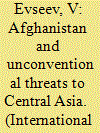

|
|
|
|
|
| Summary/Abstract |
THE STATES OF CENTRAL ASIA faced the Afghan problem practically right in the wake of the disintegration of the Soviet Union. It first showed in ideas of radical Islam trickling into them with the resumption of ties with Uzbek and Tajik relatives who lived in Afghanistan. Uzbekistan's President Islam Karimov managed to limit the negative impact of this process. Things, however, were totally different in Tajikistan where for the duration of civil war Afghanistan was in effect a hinterland base for the irreconcilable opposition.
|
|
|
|
|
|
|
|
|
|
|
|
|
|
|
|
| 2 |
ID:
137334
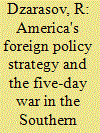

|
|
|
|
|
| Summary/Abstract |
CRIMEA WAS UNIFIED with Russia so fast that the U.S. intelligence community was caught unawares. According to the normally well-informed The Wall Street Journal, "the Obama administration is 'very nervous,' says a person close to the discussions. 'This is uncharted territory'."1 This was more than a one-time failure to predict what the Russian special services had been planning: it was a huge political flop of American strategy in Ukraine. Russia demonstrated that the degree of its readiness to stand opposed to any challenges of the West was unprecedented since the end of the Cold War, something what the United States did not expect.
|
|
|
|
|
|
|
|
|
|
|
|
|
|
|
|
| 3 |
ID:
138048
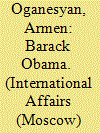

|
|
|
|
|
| Summary/Abstract |
DURING his 40-minute-long address to the UN General Assembly, President Obama sounded less like a president and more like a prophet" or a preacher with a mission to reveal the truth about the world to mankind. The host is expected to be restrained, especially in view of the realities of the day. This time, the host pushed aside all rules to confirm the old truth that weaker positions are defended by stronger rhetoric. It seems that time has come for the UN Security Council and General Assembly to revise the tradition of long introductory speeches. Indeed, people who represent the world community are exposed to endless bragging and all sorts of opinions voiced by the leader of one, even if the most influential, country.
|
|
|
|
|
|
|
|
|
|
|
|
|
|
|
|
| 4 |
ID:
137349
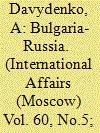

|
|
|
|
|
| Summary/Abstract |
The conference was sponsored by Bulgaria's nongovernmental organizations: the Slavyane Foundation, the Bulgaria-Russia Foundation, the Bulgaria-Russia Forum, and the Federation of Friendship with Peoples of Russia and the CIS. Assistance in organizing the conference was provided by the Diplomatic Institute of the Ministry of Foreign Affairs of the Republic of Bulgaria, the National Association of International Relations, the Bulgarian Diplomatic Society, and the Bulgarian Academy of Sciences.
|
|
|
|
|
|
|
|
|
|
|
|
|
|
|
|
| 5 |
ID:
137340
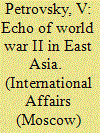

|
|
|
|
|
| Summary/Abstract |
THE UNSTABLE SITUATION in East Asia and the Asia-Pacific region, the presence of unresolved territorial disputes and conflicts, and the lack of regional security and cooperation mechanisms have their roots in the events of recent history in the second half of the 20th century and stem from the related historical and geopolitical tensions.
|
|
|
|
|
|
|
|
|
|
|
|
|
|
|
|
| 6 |
ID:
137345
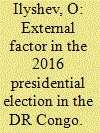

|
|
|
|
|
| Summary/Abstract |
APRIL 2014 marked twenty years since the beginning of the genocide of the Tutsi of Rwanda; organized by the Hutu and practically ignored by the key international actors and the UN it went on for three months to shape the future of Rwanda* and echoed across the vast Great Lakes region, first and foremost in the Republic of Zaire (the Democratic Republic of the Congo, DRC, since May 1997). Hundreds of thousands of refugees, both Tutsi and Hutu,** created a big seat of tension in the country's east; in 1997, the Mobutu regime fell victim to this tension fanned by inner ethnic and political contradictions which in 1996 had developed into an armed conflict still going on in the east of the DR Congo.
|
|
|
|
|
|
|
|
|
|
|
|
|
|
|
|
| 7 |
ID:
137325


|
|
|
| 8 |
ID:
137322


|
|
|
|
|
| Summary/Abstract |
Meetings with the diplomatic corps have become a tradition. We need this direct conversation to make an overall assessment of the situation in the world, to set current and long-term foreign policy objectives and on that basis to more effectively coordinate the work of our missions abroad.
|
|
|
|
|
|
|
|
|
|
|
|
|
|
|
|
| 9 |
ID:
137328
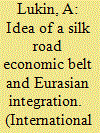

|
|
|
|
|
| Summary/Abstract |
IN A SPEECH at Nazarbayev University in Astana on September 7, 2013. President Xi Jinping of the People's Republic of China (PRC) proposed the idea of building an economic belt along the Silk Road as a new form of enhancing cooperation between China, the Central Asian states and Russia. Various aspects of this idea have become a topic of heated debate in China and other countries. In order to identify the new elements of this concept and understand its role in the contest of ideas and projects associated with Central Asia, we must take a brief look at the history of this issue.
|
|
|
|
|
|
|
|
|
|
|
|
|
|
|
|
| 10 |
ID:
137333


|
|
|
|
|
| Summary/Abstract |
FOR FIVE YEARS, Marc Sagnol headed the French Institute in Kiev; an expert in Germanic languages he also has excellent command of Russian, Polish and Ukrainian, to say nothing of Western tongues. The text offered here is a valuable evidence of the events which were unfolding in Kiev, including the insurrection. Thanks to his linguistic proficiency and knowledge of the country he could better grasp the meaning of what was unfolding before his eyes without prejudice and hasty conclusions. Having come to Kiev to make a film about Paul Celan* he never expected that, during his very short stay in the Ukrainian capital, the crisis would reach the boiling point. Anybody reading his article will inevitably see that Ukraine was not a country without a past and that the struggle for civil rights and democracy is a smokescreen for a revival of the old forces defeated in World War II but still very much alive. People familiar with my films know that the guards in Sobibór (and other concentration camps) were Ukrainians. This does not mean that the past lives indefinitely; it means that the naïveté with which the old good democrats ignore the depths of History and its wounds will bring bitter fruit.
|
|
|
|
|
|
|
|
|
|
|
|
|
|
|
|
| 11 |
ID:
137346
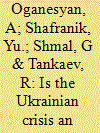

|
|
|
|
|
| Summary/Abstract |
Armen Oganesyan, Editor-in-Chief of International Affairs Today, we will discuss the Ukrainian crisis and its impact on the Russian energy sector. A good deal can be said about that, but it would be desirable if, in analyzing this situation, we would not digress into topics that before long will evidently become irrelevant. Let us look at the situation globally, strategically, in conjunction with geopolitics. Yuri Konstantinovich, you are welcome.
|
|
|
|
|
|
|
|
|
|
|
|
|
|
|
|
| 12 |
ID:
137331


|
|
|
|
|
| Summary/Abstract |
JUNE 25, 2014 brought the news that the International Committee of the Red Cross (ICRC) had recognized militants in the southeast of Ukraine as a "party to the conflict." Alexander Borodai, prime minister of the Donetsk People's Republic, announced this at a press conference, and showed a relevant memorandum. This recognition by the ICRC is a significant signal for the international community, as it establishes the international legal status of the armed confrontation in Ukraine. From the point of view of the ICRC, the standoff is a non-international armed conflict.
|
|
|
|
|
|
|
|
|
|
|
|
|
|
|
|
| 13 |
ID:
137330
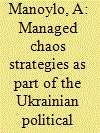

|
|
|
|
|
| Summary/Abstract |
TODAY, there is a lot of talk about the recent initiative of Ukrainian President Poroshenko: temporary ceasefire at the line of confrontation between the Ukrainian punitive forces and the militia of the Donetsk and Lugansk People's Republics. It remains to be seen who will profit from the respite - the population of the republics or the president who feigned peace-seeking to regroup his army battered by the militia, strengthen it with a fresh mob of fanatics and bring armored machinery closer to the frontline.
|
|
|
|
|
|
|
|
|
|
|
|
|
|
|
|
| 14 |
ID:
137335
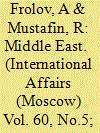

|
|
|
|
|
| Summary/Abstract |
The Ukrainian crisis eclipsed the Middle East and the Arab revolutions which, however, have not disappeared without trace. Seemingly identical and deceptively monochrome, they rolled across the Arab world revealing their specifics and bringing very different results ranging from a backtrack revolution in Egypt to chaos and instability in Libya, from the regime's firmer grip on power in Yemen, to what looks like chronic confrontation in Syria and a complete failure in Bahrain. The Middle East has come close to the threshold of modernization of social relations and the style of governance, even though there is a widely accepted opinion that in 2013 the revolutions exhausted their vigor.
|
|
|
|
|
|
|
|
|
|
|
|
|
|
|
|
| 15 |
ID:
137323
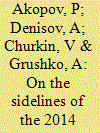

|
|
|
|
|
| Summary/Abstract |
Pogos Akopov, president of the Association of Russian Diplomats, Distinguished Worker of the Diplomatic Service, Ambassador Extraordinary and Plenipotentiary: I was lucky enough to participate in all the conferences, starting from the first one. This very important event at the Foreign Ministry with the participation of all foreign representatives, all ambassadors plays a special role. The head of state, who oversees the Foreign Ministry, speaks here. It is extremely important for ambassadors, permanent representatives of our country abroad to hear his assessment of the situation in the world.
|
|
|
|
|
|
|
|
|
|
|
|
|
|
|
|
| 16 |
ID:
137324


|
|
|
| 17 |
ID:
137336
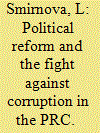

|
|
|
|
|
| Summary/Abstract |
THE QUESTION OF POLITICAL REFORM in China in the scholarly literature and newspaper reports often comes down to a dilemma: either China will follow the path of post-Soviet-type democratization, or it will remain committed to the old postulates of communist development. However, the experience of state-led efforts to reform China has proved more than once that China seeks its own path to political modernization, not confined to these two extremes.
|
|
|
|
|
|
|
|
|
|
|
|
|
|
|
|
| 18 |
ID:
137327
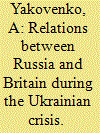

|
|
|
| 19 |
ID:
137347


|
|
|
|
|
| Summary/Abstract |
AT THE VERY BEGINNING of April, revelations by the Associated Press blew up not only the Cuban, but also the global media sphere. They showed that in 2010-2012 Washington created and secretly funded a mobile social network called ZunZuneo for a Cuban audience, with far-reaching goals.
|
|
|
|
|
|
|
|
|
|
|
|
|
|
|
|
| 20 |
ID:
137348


|
|
|
|
|
| Summary/Abstract |
IT WILL HARDLY BE an exaggeration to say that now the Russian-Tajik relationships are on the upswing. This contrasts particularly with some pause in their development path, which lasted from late 2012 to the fall of 2013 and was due to the hammering out of the final details of a key agreement on a Russian military presence in Tajikistan. However, once resolved, the interaction between Moscow and Dushanbe received additional impetus practically in all spheres of activity.
|
|
|
|
|
|
|
|
|
|
|
|
|
|
|
|
|
|
|
|
|